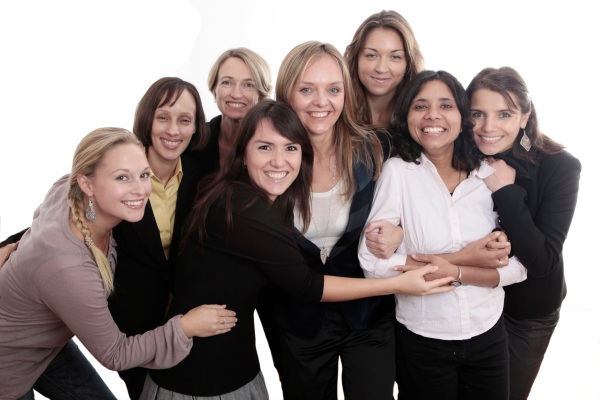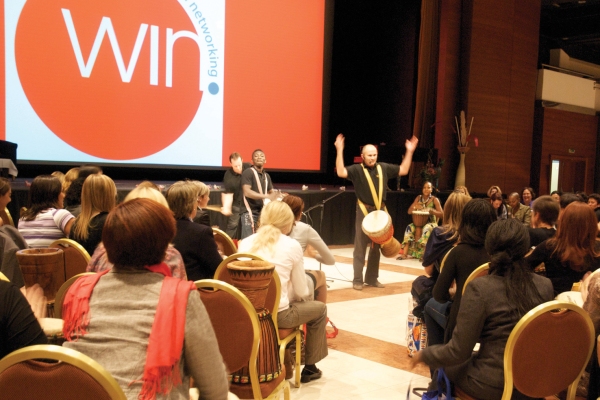"Nobody is a nobody," this is one of the nuggets of advice that Kristin Engvig imparted to her guests and attendees at the recent W.I.N., Women's International Networking, conference that took place in Paris the first week of October.
A conference already in its 13th year, Founder Kristin Engvig, a resident of Switzerland, has built her success upon the foundational principles such as compassion, caring, commitment and the ability to listen to one another, regardless of gender.
"We have the responsibility to really listen to each other. And when we're listened to, we become more responsible," said Engvig, during a recent interview. "I have discovered that when we are listened to, we become more careful of what we say. It's also a matter of creating an environment we feel safe in, where people feel OK to be themselves. To be listened to is an incredibly empowering experience," shared Engvig.
This environment of caring and sharing of global and authentic, is precisely what speakers and participants experienced at W.I.N. over the course of three days this October in Paris.
To help center and focus the 800 attendees, the morning plenary sessions began with piano recitals such as a musical selection from Chopin. The music set the tone for both calm serenity and focused attentiveness. And then the speakers let forth...
Women Are A Global Massive Business Opportunity
Speaker Avivah Wittenberg used an anecdote that resonated with all attendees: She asked how many guests carried a handbag or a purse? Every female hand in the audience went up. She then asked How many women drive cars? Approximately 90% of hands went up. She then asked, How many women drive a car that is designed with a space specifically to store a handbag? Not one hand was raised.
"We are not a minority. We are not a diversity. We are a huge, massive global business opportunity," she said. The current global purchasing power of women is $1.3 trillion, a figure that is more than India and China combined.
WWW = Web, Women, Weather
Conference speakers were asked to address the attendees on the three W's of the 21st century: Web, women and weather, otherwise known as tenchnology, women and climate change.
Roberta Coceo of Microsoft, Italy pointed out that there is a proven correlation between women's participation in the economy and workforce and a country's GDP. There is also a proven positive correlation between childbearing and countries where women are significantly engaged in the workforce.
Women And Climate Change
Royal Dutch Shell's V.P. of Strategy, Dick Benschop noted that what keeps executives up at night is the need to attract and retain top talent, regardless of gender. He noted that at shell, "diversity" means all the ways they are different, whether that's age, gender or ethnicity.
On renewables, he said, "If there's going to be an energy revolution, it should start on the demand side because on the supply side it will take more time to build or re-build the infrastructure. History has shown us that it takes about 30 years for new energy sources to become even 1% of the world's energy source."
The Gulf Oil Tragedy is a nightmare he brought up in his speech stating that the industry has a "moral obligation" to learn from it. In order to do this, "We need to attract the best minds and talent. We will continue to attract the best and most innovative women and men."
A Pomegranate World
Engvig, mother of a 9-year-old who herself lived 12 years in Italy before settling in Switzerland, noted that there is something "Really Big" happening with women right now. There is a focus on the well-being of women. "As we listen behind the headlines and statistics about depressed, overworked and stressed women in the West or poor women in Africa, we know, deep in our hearts, that there is a human being, a unique individual behind each story, with hopes, dreams and destinies."
There are also issues that are endemic to women globally as well as regional issues such as water and hygiene in developing countries or maternity leave in N. America, or gender gaps in the workforce in Europe. For example, the World Economic Forum recently rated Italy number 72 in terms of gender gap.
Many of the conference attendees and speakers spoke of the shift from a pyramid world, where structures are top-down and hierarchical, to a pomegranate world, where the landscape is diversified, dispersed, organic. The pomegranate landscape, coupled with this massive arrival of women into economic roles, has never been seen before in the history of the world. Reflecting on this, I think I'll take a(nother) piece of wisdom from Engvig, "Expect magic to happen!"













